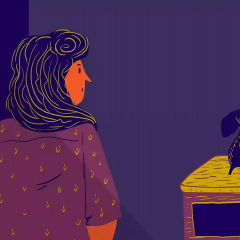The recent spate of terrorist attacks in the UK and elsewhere highlights more than ever what many police, researchers and policymakers have been saying for some time: Early intelligence from communities, especially those ‘intimates’ close to people who may be radicalising to violence, is crucial for the early disruption of terrorist plots. A good number of terrorist actions in many countries have been prevented because family or friends have come forward to authorities with information that has prevented attacks from occurring.
However, until recently virtually no public research had been conducted that helped us understand what the experience of sharing information with authorities was like for family members and close friends. Agencies and policymakers had little insight or evidence for what helped facilitate early reporting; what the thought processes and dilemmas for reporters are; what barriers to reporting might exist, and how to overcome them; and, critically, whether existing systems for receiving, triaging and acting on information from families, close friends and communities might be helping or impeding the flow of essential information to the right places at the right time.
A 2015 government-funded academic study in Australia was the first to ask these questions directly and to develop an evidence base from which to consider whether current approaches and expectations around what the researchers called ‘intimates’ reporting were working, and if not, what needed to change. This pilot study interviewed 33 Australian community members and government stakeholders with a high level of knowledge and contact around community reporting experiences.
For individuals, the findings confirmed that people largely report on those close to them out of care and concern for the person radicalising to violence, as well as fear of the damage or harm they may cause to others. Worries about targeting, stigma and disproportionate responses by police if their fears are unfounded can inhibit reporting. And, significantly, they have an overwhelming preference for face to face reporting, rather than by telephone hotline or online web-based channels.
They have an overwhelming preference for face to face reporting, rather than by telephone hotline or online web-based channels
Trust and transparency were the key ingredients people wanted to see as reassurance during the process, and for this reason, there was a strong preference for reporting to community-based intermediaries rather than directly to authorities. The study results also highlighted the significant isolation and conflict many felt when considering the personal impacts of sharing what they knew or suspected, with authorities. These included feelings of guilt, shame, loss of social belonging and betrayal: in other words, ‘knowing’ they were doing the right thing but nevertheless ‘feeling’ it was wrong.
However, beyond individual experiences, the Australian study also revealed key issues at the level of current systems and structures around reporting interfaces with authorities. The most important of these were indications that people were confused or unsure of how to report, when and to whom. The second key issue was what the study called ‘the leaky pipeline’, in which initial or tentative efforts to share information, say with local police, saw those reporting bounced around from one agency or telephone service to another. The leakier the pipeline, the easier it is for people to lose heart, second-guess their decision to report and drop out of the process.
In the UK, a CREST-funded study expands and develops the approach of the Australian study through a sample of 75 community members and professional practitioners, with a particular focus on young adults, matching the demographic profile of many plotters and those who travelled to Syria. The UK study’s preliminary findings suggest we need to re-examine policy and practice approaches around two key issues.
First, sharing concerns with authorities about an ‘intimate’ is likely to be the last resort, with respondents much more likely to seek help from figures of authority within communities first. This suggests that policy needs to acknowledge this reality and work in partnership with community organisations – the State needs to show more trust in community organisations as partners in terrorism prevention in the same ways it has done around hate crime reporting. This obviously raises issues around the current image and public understanding of the UK’s Prevent strategy. Respondents would also consider sharing concerns with trusted professionals, such as university lecturers and doctors.
Reporting processes around terrorism are not clearly understood by community members or professional practitioners and need to be both strengthened and clarified
Second, reporting processes around terrorism are not clearly understood by community members or professional practitioners and need to be both strengthened and clarified. As in Australia, respondents in our current study express a strong preference for face to face reporting – they largely do not trust on-line or telephone-based methods. This clearly raises issues about the local availability of policing services and of the training and preparedness of front-line policing personnel to receive and respond appropriately to reports of concern.
It is in all our interests that this sort of research evidence can help strengthen approaches that enable community sharing of concerns about potential or existing terrorist activities and threats, to support early intervention.
Copyright Information
As part of CREST’s commitment to open access research, this text is available under a Creative Commons BY-NC-SA 4.0 licence. Please refer to our Copyright page for full details.
IMAGE CREDITS: Copyright ©2024 R. Stevens / CREST (CC BY-SA 4.0)








